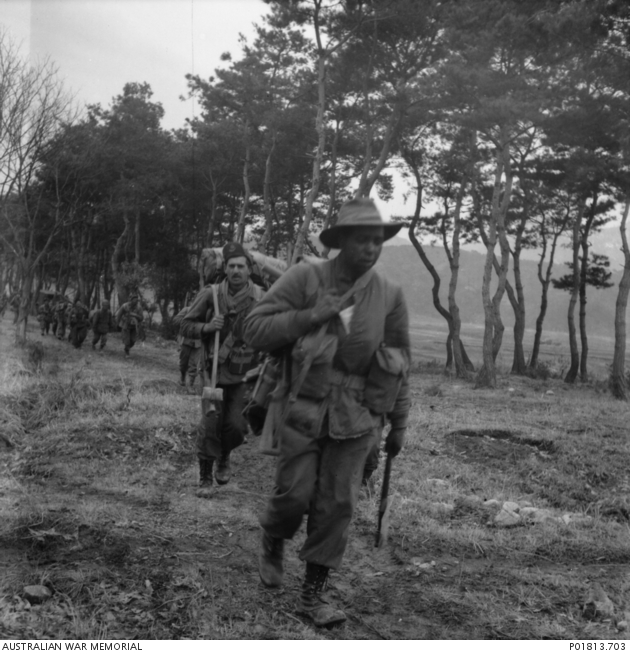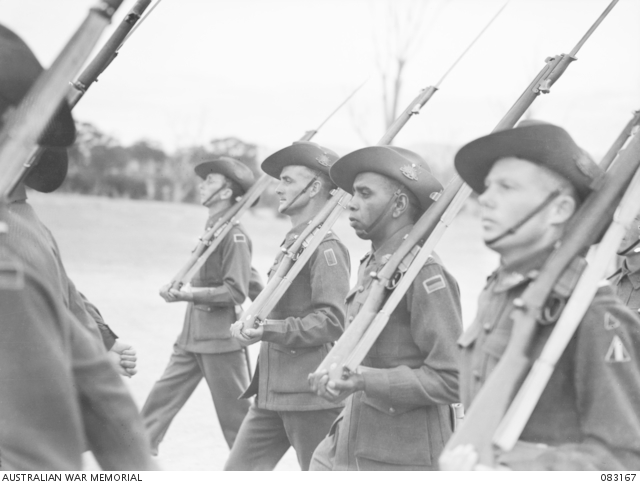Out in the Cold: Australia's involvement in the Korean War - Captain Reg Saunders
“Reg Saunders was one of the best company commanders I had served under and he was admired by the company as an excellent leader.”
Private Joe Vezgoff
Many Aboriginal Australians have been a part of the Australian armed forces since the Boer War. Although not permitted to become Australian citizens until 1968, service in the armed forces was one area where Aborigines experienced less discrimination than in the wider Australian society. Captain Reg Saunders, MBE, is perhaps Australia's best known Aboriginal soldier, being the first indigenous Australian to be commissioned as an officer into the Australian Army, in 1945. In Korea, he served as Officer Commanding, C Company, 3 RAR.
“Saunders quickly established himself and won wide respect for his abilities as a platoon commander, particularly for his determination when leading patrols far from the battalion's main position.”
Robert O'Neill, Official Historian of Australia in the Korean War
Reg Saunders was born in 1920, in Purnum, Victoria, near the Framlingham Aboriginal Reserve. He came from a long line of soldiers. Both his father and his uncle served in the First World War. His uncle, Reg Rawlings, for whom he was named, received a Military Medal for action at Morlancourt Ridge, France. Rawlings was killed in action at Vauvillers, in 1918.
In the Second World War, Reg Saunders and his brother Harry both served in the army. Harry was killed in action in New Guinea. Reg was shot in the knee in a separate action, but returned to the 2/7th Infantry Battalion after his recovery.
When he joined up again for service in Korea, Reg led his company through fierce fighting, including the battle at Kapyong in April 1951. He was the first Aboriginal serviceman to command a rifle company, and was respected and popular with his men. His biographer and friend, Harry Gordon, an Australian journalist in Korea, wrote of him:
“He was accepted unreservedly by the men who served with him because false values do not flourish among front-line soldiers.”
Reg Saunders commented:
“The Americans had negro officers, but they handled negro troops. Sometimes it was suggested to me that Australia should have its own Aboriginal battalion. I'm dead against the idea … it would mean a line of demarcation - a separateness. They would be treated as something apart, and that would be bad.”
After service in Korea, Saunders remained in the regular army for a year before resigning his commission. Returning to civilian life proved a difficult transition. Having been accustomed to leading others in difficult and dangerous situations, and to being a respected and admired officer, when he returned to Australian society he faced discrimination; his qualities as leader went unappreciated. After years of difficulty, he had a successful career working for the Aboriginal Affairs Office and later at the Department of Aboriginal Affairs. He died in 1990.
Cecil Fisher was another Aboriginal Australian who fought in Korea, joining up at the age of 18 years and 10 months to serve with 2 RAR. His poem, “Black ANZAC”, draws on his experiences in the Korean War.
Black ANZAC
They have forgotten him, need him no more
He who fought for his land in nearly every war
Tribal fights before his country was taken by Captain Cook
Then went overseas to fight at Gallipoli and Tobruk
World War One two black Anzacs were there
France, Europe's desert, New Guinea's jungles, did his share
Korea, Malaya, Vietnam again black soldier enlisted
Fight for democracy was his duty he insisted
Back home went his own way not looking for praise
Like when he was a warrior in the forgotten days
Down on the Gold Coast a monument in the Bora Ring
Recognition at last his praises they are starting to sing
This black soldier who never marches on ANZAC Day
Living in his Gunya doesn't have much to say
Thinks of his friends who fought some returned some died
If only one day they could march together side by side
His medals he keeps hidden away from prying eyes
No one knows, no one sees the tears in his old black eyes
He's been outcast just left by himself to die
Recognition at last black ANZAC hold your head high
Every year at Gold Coast's Yegumbah Bora Ring site
Black ANZAC in uniform and medals a magnificent sight
The rock with Aboriginal tribal totems paintings inset
The Kombumerri people's inscription of LEST WE FORGET
Fisher, Cecil, 1993.
Poem `Black Anzac', written in commemoration
of all Aboriginal servicemen who have fought for Australia.
Seymour Vic., 25 November 1944.
Lieutenant Reg Saunders (second from left) at the graduation ceremony from the officers' cadet training unit.



